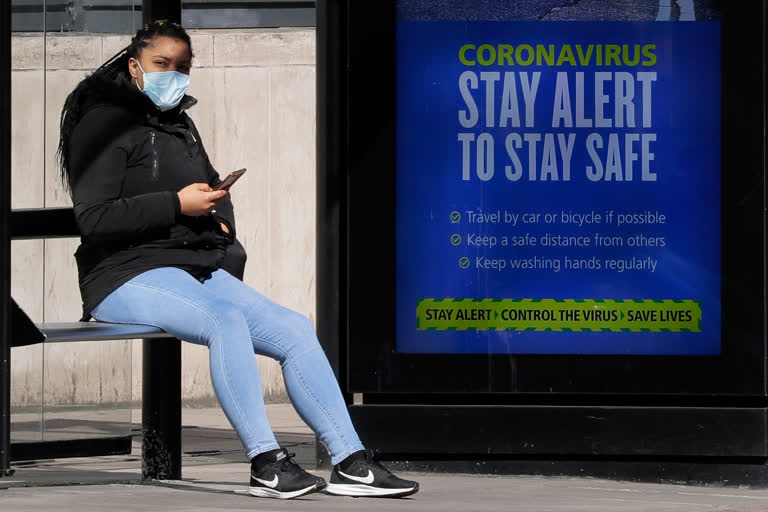London: UK Prime Minister Boris Johnson on Sunday outlined a "conditional plan" for reopening Britain in the coming months, including the possible return to school for some young children at the start of June, as well as some easing of the coronavirus lockdown in England.
In a televised address to the nation, Johnson said this is "not the time, simply, to end the lockdown this week," but that it was appropriate to make some changes, including encouraging people with jobs that cannot be done from home to return to work.
A 50-page government document outlining cautious steps to ease restrictions said, "People should aim to wear a face-covering in enclosed spaces where social distancing is not always possible and they come into contact with others that they do not normally meet, for example on public transport or in some shops."
Read also:Pandemic breaches White House walls as uncertainty looms over US polls
That is a recommendation rather than a rule, and people won’t be penalised if they don’t wear a mask.
The government outlined a three-stage approach to end lockdown, beginning from Wednesday with a relaxing of limits on outdoor activity. People in England may take unlimited amounts of exercise, rather than just one trip out a day, and may sit and sunbathe outdoors. Driving to a park or beach will be permitted, and golf courses and tennis courts can reopen.
If there is no new spike in infections, that will be followed in June by a return to class for some young school pupils, the reopening of nonessential shops and the return of televised sports, played behind closed doors. A third stage, penciled in for July at the soonest, would see the gradual reopening of restaurants, cafes, pubs, hairdressers and other businesses.
Read also:Watch: The eerie beauty of deserted Paris
Johnson told lawmakers that “if the alert level begins to rise we will have no hesitation in putting on the brakes.”
Johnson, who was hospitalised last month with a serious bout of COVID-19, also said that within weeks the UK would impose a 14-day quarantine on people arriving by air. Travellers from Ireland and France will be exempted.
While many people welcomed the prospect of an end to lockdown, there was confusion about the measures, which were announced by Johnson in a televised speech almost 24 hours before the details were published.
“What the country needs at this time is clarity and reassurance, and at the moment both are in pretty short supply," said Keir Starmer, leader of the main opposition Labour Party.
Johnson extended most of the draconian restrictions on daily life imposed March 23, including the closure of schools, restaurants and most shops.
Britain has reported over 32,065 coronavirus deaths, the highest in Europe and the second-highest in the world after the US. While the number of new deaths and infections is falling, Johnson said it would be “madness” to loosen restrictions so much that there is a new surge in cases.
But he made a dramatic shift in tone on the economy. Since March 23, workers have been told to stay at home. Now Johnson said “anyone who can’t work from home, for instance those in construction or manufacturing, should be actively encouraged to go to work.”
He said that workplaces should observe social distancing and people should avoid public transport if possible, travelling "by car or even better by walking or bicycle".
Employees, business owners and trade unions expressed concern about the gear-change, saying the advice was confusing and potentially dangerous — especially in a big city like London, where most people do not own cars and where subways are operating at a fraction of their usual capacity.
Some expressed fears that people in low-paid jobs, who are less likely to be able to work from home, will be put at risk. That concern was underscored by official statistics showing that men working as security guards, construction workers, transit workers and shop assistants had experienced higher-than-average mortality in the outbreak. Men overall are about twice as likely as women to die with the coronavirus.
London’s Waterloo station, usually the country’s busiest train hub, remained largely quiet on Monday morning but commuters venturing back to work said they worried that services would soon be thronged again.
Peter Osu, 45, who was returning to work at a construction site for the first time since the lockdown started, said he felt nervous.
“People were sitting close together on the (subway) and others were having to stand," he said. "There was no 2-meter spacing. This is the first day. Can you imagine what it’s going to look like by the end of the week?”
The governments in Scotland, Wales and Northern Ireland, extended their lockdowns prior to Johnson's speech and eased restrictions less than the steps the prime minister announced for England. That prompted questions over the potential for divergent approaches across the UK in the months ahead. Up until now, they have moved in lockstep on virus regulations.
Johnson is at odds with the leaders of Scotland, Wales and Northern Ireland after his government replaced its “Stay at Home” public health slogan with a new “Stay Alert” message, wording that raised concerns about the potential danger of mixed messaging. They said they would retain the “Stay at Home” message.
Semi-autonomous authorities in Scotland, Wales and Northern Ireland, who urged caution and said they would not automatically adopt the measures Johnson has announced for England.
Scotland's pro-independence First Minister Nicola Sturgeon, who differs with Johnson on many issues, said that "the risk is still too great" to ease the lockdown, though she said Scots could now do unlimited outdoor exercise.
“But otherwise we are asking you to stick with lockdown for a bit longer -- so that we can consolidate our progress, not jeopardize it,” she said.
AP
